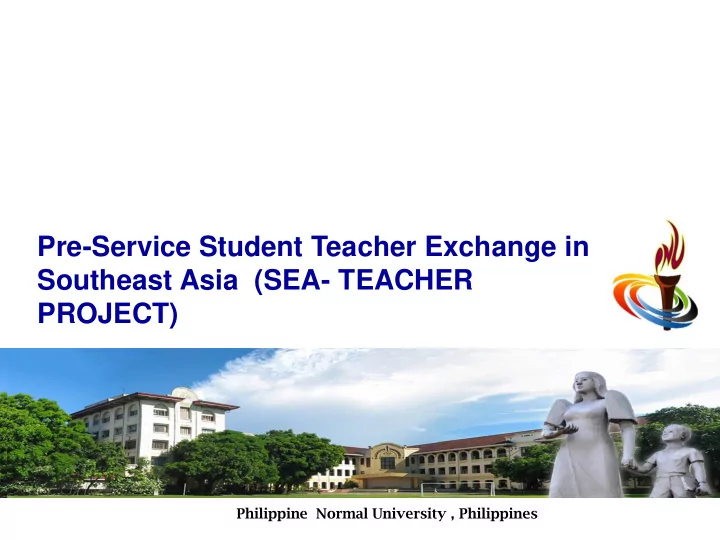

Pre-Service Student Teacher Exchange in Southeast Asia (SEA- TEACHER PROJECT) Philippine Normal University , Philippines
What is the process of selecting students from your university to join the project? Based on the interview and the background information, the Associate Dean and/ or in consultation with faculty in the specialization selects the applicant and submitted the name to the Dean of the College of Teacher development for final approval. The Associate Dean of the Faculty and/or selected faculty teaching the specialization conducts interview of the applicants. This is to find out student’s readiness to participate in the program Students express their interest through a letter of application addressed to the Dean/ Associate Deans of respective faculties Announcement of the SEA-Teacher Project to all fourth year students who are about to take their Practice Teaching in the coming term/ school year
What is the process of selecting students from your university to join the project? The criteria for selection include: Good academic standing/record Proficiency in English language Seriousness of Purpose for joining the SSEA Teacher Project Readiness to live and be exposed in a different cultural setting Commitment to teaching and learning
Where was their practicum school and what is the monitoring & evaluation process? Critic Teachers in Partner Schools of the Department of Education PNU Institute of Teaching and Learning Supervising Instructors
Where was their practicum school and what is the monitoring & evaluation process? • All practice teachers are assigned a university supervisor who is a specialist in a particular area coming from the PNU Institute of Teaching and Learning. • Students do their practice teaching in the Partner Schools which are public schools under the Department of Education. They may also choose to be assigned at the Institute of Teaching and Learning (ITL). They will be assigned to a Critic Teacher who handles the classes where the student teachers are assigned. • The Critic Teacher is responsible for assessing the student teacher in his/her day to day teaching performance through observation and conferencing.
Where was their practicum school and what is the monitoring & evaluation process? • The University supervisor conducts school visits where the student teacher is observed unannounced two or three times using an observation guide. A formal demonstration teaching by the practice teacher is usually held at the end of the practicum with the university supervisor, critic teacher and invited school teachers are present to observe the demo teaching. A post conference ensues where the practice teacher will be evaluated by those who were present.
Evaluation and Assessment Process • To assess the Practice Teachers performance, they are required to submit the following: – Self inventory of the practice teachers ‘ competency and teaching philosophy; – Summary of the practice teachers’ professional readings on teaching and learning that will help them in their teaching – Journal of their practice teaching experience – Observation notes on actual teaching that they observed with the help of an observation guide.
Evaluation and Assessment Process The Critic Teacher conducts the final evaluation of the pre service student’s performance using the overall assessment assessment tool. Students are expected to submit at the end of the practice teaching period a portfolio showing all the learning and experiences of the student teacher.
What are the lessons learned in view of students and university? Students’ View “I am thankful for this program for opening up my horizon to the vast world where I can use English as a tool to connect with others. Also, as a teacher, how to equip the learners with this tool to help them as well. During the 4 week exchange program I realized the role of English Education in the ASEAN community in terms of cultural sharing, collaboration, and development towards a common goal.”
What are the lessons learned in view of students and university? Students’ View “The welcoming atmosphere and the friendly regard of the people, from the officials in the university and even our cultural informants were a great help in my adjustment and it made me cherish the experience more. UPI also made sure to provide us with opportunities to immerse ourselves in the culture by taking us out to see the community during the weekend which creates in me a heightened respect and understanding of the uniqueness of Indonesian society and culture and its notable similarities with Philippine culture, in terms of food, words, and manners. These small links lead to deeper empathy and understanding”
Specific Lessons Learned • The duration of the program is enough for the teachers to maximize their experience. It may be good to hold the exchange program in the middle of the school year . • More time and focus on observing the practice teachers during demonstration teaching for students to benefit more from the supervisor’s comments and suggestions. • Maybe, specific standard targets for what the practice teachers need to accomplish at the end of the period may be helpful to the practice teachers. • If possible, during the first two days of deployment in the schools where student teachers, a guide can help practice teachers familiarize themselves with the location and school setting .
What are the lessons learned in view of students and university? University View • The exchange provides the university an opportunity to see similarities and differences in terms of ASEAN universities’ approaches and strategies for practice teaching - ways by which we can identify our strengths and limitations and at the same time learn from each other. • The exchange is also an opportunity to collaborate to improve the curriculum of the different program areas in teacher education and explore possible research areas in teacher mentoring for ASEAN teacher Education.
What are the lessons learned in view of students and university? University View • The exchange heightens the importance of collaboration between institutions to improve competence of future ASEAN teachers and discover the “ ASEANess ” of our teacher education curriculum.
Thank you!
Recommend
More recommend